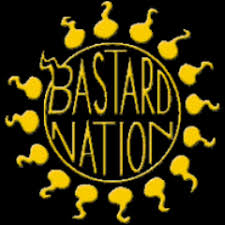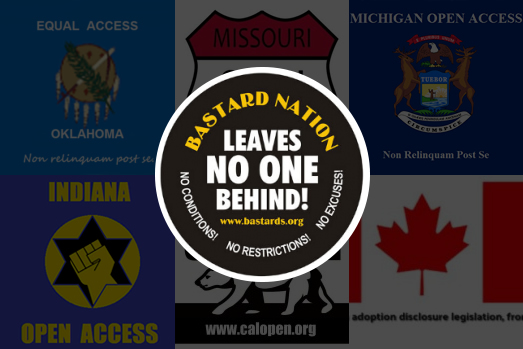Bastard Nation: the Adoptee Rights Organization
PO Box 4607
New Windsor, New York 12553-7845
bastards.org 614-795-6819
bastardnation3@gmail.com
TO: Honorable Members of the West Virginia House of Representatives and Senate
FROM: Marley Greiner, Executive Chair
RE: HB4815 and SB153– Adoptee Original Birth Certificates: Letter of Opposition
DATE: January 20, 2024
Bastard Nation: the Adoptee Rights Organization is the largest adoptee civil rights organization in the United States. We support only full unrestricted access for all adopted persons to their original birth certificates (OBC) and related documents.
We urge you to reject HB 4815 and SB153 bills that seriously restrict the right of West Virginia-born adoptees to obtain their original birth certificates. The bills were written without the input of adopted persons, the West Virginians most impacted by these proposals. They do not represent, reflect, or promote adopted peoples’ interests, current best practices in adoption, or how adoption actually works.
HB4815 is a confusing bill that requires adult adoptees to apply UNSUCCESSFULLY to the West Virginia Mutual Consent Registry for their identifying information before they can apply for their OBC. It contains a petition process, and ”good cause” determination. To add insult to injury, the bill requires them to complete an infantilizing and demeaning one-hour counseling session with a social worker employed by the registry or a social service agency as if adoptees who seek their birth records, personal histories, and biological family connections are mentally or emotionally disturbed or even dangerous.
SB153 is another nonsensical bill that redacts by default, all identifying information on the birth record, unless a biological parent specifically authorizes, via a Department of Health consent form, the release of the unredacted document
In effect, this means that under SB153, barely anyone would qualify for a true copy of their OBC. Dead people won’t submit consent forms. Those who don’t know about the law won’t submit consent forms. To make this proposal more ludicrous, adoptees whose biological parents never submitted a release form for whatever reason, remain restricted from obtaining their OBC when the parents die. A Zombie veto! It’s kinda like West Virginia lawmakers want to prove a negative.
At a time when states are restoring the right for their adopted citizens to obtain their OBCs without restriction or condition, West Virginia lawmakers have inexplicably decided to take several steps backward and enact a bill that even 50 years ago would not have been acceptable. In reality, SB153 restricts OBC access more than the current law. Passage will set a reactionary legal precedent: no other state redacts OBCs by default
And what’s with the “educational requirement” that an adopted person be a high school graduate, earn a GED, or officially drop out of school to obtain their original birth certificate?
Now, I want to take a minute to clear up what I believe is the chief problem with lawmakers and OBCs: “adoption privacy.”
Adoption Privacy Overview
Privacy” “confidentiality,” and” anonymity” are not synonymous either legally or linguistically. “Anonymity “is a myth perpetuated by special interests that for decades have profited off of economic distress and society-induced shame and family crisis. In many cases, adoption is a permanent solution to a temporary problem that has not only individual but generational consequences.
There is no evidence in any state that OBCs were sealed to “protect” the reputation or “privacy” of biological parents who relinquished children for adoption.
On the contrary, records were sealed to cover coercive child acquisition practices by adoption agencies, black and gray market baby dealers, exploitative assembly-line maternity homes, and other corrupt systems. Numerous historical and legal researchers and writers have shown that OBCs were never intended to be sealed in perpetuity from individual adoptees as adults. At “best” sealed OBCs were billed as a way to protect the reputations of “bastard children” (not adults) and to protect adoptive families from birthparent and stranger interference. These documents were first sealed from the public, then the parties to the adoption, and eventually to adopted people themselves. What was once an outlier practice has now been normalized through a mix of myth and “tradition” and treated like ”the way it’s always been.”
Courts, however, have ruled that adoption anonymity does not exist. (Doe v Sundquist, et. al., 943 F. Supp. 886, 893-94 (M.D. Tenn. 1996) and Does v. State of Oregon, 164 Or. App. 543, 993 P.2d 833, 834 (1999). Laws change constantly, and the state, lawyers, social workers, and others were never in a position to promise anonymity in adoption. In the over 60 years of the adoptee equality battle, not one document has been submitted anywhere that promises or guarantees sealed records and an anonymity “right” to birthparents.
Identifying information about surrendering parents often appears in court documents given to adoptive parents who can at any point give that information to the adopted person. (In some states adoptive parents, at the time of the adoption order, can petition the court to keep the record open.) The names of surrendering parents are published in legal ads. Courts can open “sealed records” for “good cause” without birthparent consent or even knowledge. Critically, the OBC is sealed at the time of adoption finalization, not surrender. If a child is not adopted, the record is never sealed. If a child is adopted, but the adoption is overturned or disrupted, the OBC is unsealed. he e OBCs of persons with established relationships with biological parents as in stepparent and foster adoptions are also sealed.
On a related note: under West Virginia law an adopted person, upon reaching 18 years of age, can file a “dissent” to the adoption in the circuit court that granted the adoption. If filed within one year of turning 18, the “adoption shall be vacated.”
The American Academy of Adoption and Assisted Reproduction Attorneys supports unrestricted OBC access. In a 2018 major about-face, it passed a monumental resolution in support of adoptees’ right to full access to our OBCs, court, and agency records.
Privacy and Technology
Today, inexpensive and accessible DNA testing services, and a large network of volunteer “search angels” that locate adoptee government-hidden information, histories, and biological families, have made the traditional “privacy” argument obsolete. Nearly all successful searches are done without the OBC and other court documents.
Conclusion
HB4815 and SB153 need to be tossed into the Kanawha. West Virginia can easily and gracefully reject these bills and their archaic ideas, by studying what other states are doing and presenting an informed clean bill free of restrictions, next session. Adoptee rights activists in West Virginia and national organizations will be happy to work with you,explain the misunderstanding around the lack of adoptee equality, and why OBCs are important. No bill pertaining to adopted people and their rights should even be considered without our input and approval..
In the meantime please vote No Pass on HB4815 and SB153. Then work on West Virginia joining the current 15 states that already acknowledge the right of adoptees to obtain their OBCs without restriction or condition. Thank you.
Bastard Nation is dedicated to the recognition of the full human and civil rights of adult adoptees. Toward that end, we advocate the opening to adoptees, upon request at age of majority, of those government documents which pertain to the adopter’s historical, genetic, and legal identity, including the unaltered original birth certificate and adoption decree. Bastard Nation asserts that it is the right of people everywhere to have their official original birth records unaltered and free from falsification, and that the adoptive status of any person should not prohibit him or her from choosing to exercise that right. Bastard Nation does not support mandated mutual consent registries or intermediary systems in place of unconditional open records, nor any other system that is less than access on demand to the adult adoptee, without condition, and without qualification





